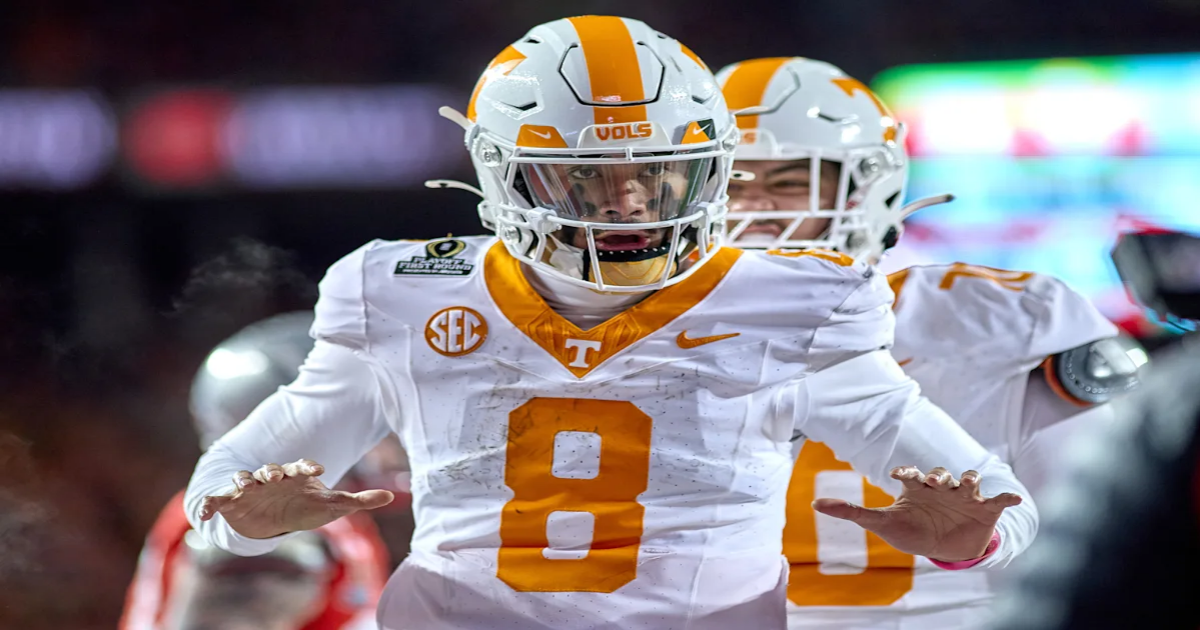So it turns out that when you put a specific dollar value on a rare commodity — say, the ability to play quarterback at a high level — and you allow people who possess that skill the freedom to shop their talent to the highest bidder … well, you’re setting the stage for chaos.
As profitable as this new era might be for players, coaches and universities loathe the chaotic state of college football right now, and they’re going to do everything possible to restore order as they see it. Thus, the seismic shock wave out of Knoxville this weekend: Tennessee quarterback Nico Iamaleava holding out for more money on the eve of the Vols’ annual Orange and White spring game … and then getting kicked to the curb by the Vol program Saturday morning.
Advertisement
Advertisement
A marquee SEC program upends its entire 2025 season … because it deems that option preferable to giving in to a player’s demands.
Iamaleava joined the Vols in 2022 on an NIL deal that pays him a reported $2 million per year. At the time, it seemed like a stunning payment — or overpayment — but just two years later, it looked like a bargain. Carson Beck, for instance, reportedly got $4 million to jump from Georgia to Miami, and Duke’s Darian Mensah is reportedly pocketing a similar figure. (NIL figures can be tricky to nail down.)
The difference between those two players and Iamaleava, though, is that they had entered the transfer portal to maximize their earning potential … and you’ll never guess what opens up next Wednesday. Hence, Iamaleava was apparently looking to secure a bigger bag with an obvious, if unspoken threat:
If you don’t want me suiting up elsewhere next year, pay up now.
Advertisement
Advertisement
The challenge for Tennessee — and Iamaleava knew this — is that the Vols ascended to a higher plane in 2024, reaching the inaugural 12-team College Football Playoff. Iamaleava deserves a large share of the credit for that; he threw for 2,616 yards and 19 touchdowns against five interceptions last season (including the playoff game). With Iamaleava under center, Tennessee averaged over 35 points per game last season in a 10-3 campaign.
A holdout put all that at risk, and soured all the goodwill coming out of the past two seasons of the Josh Heupel era. But while Iamaleava and his reps incited this incident, they were only playing by the rules as they exist — or don’t — right now. They likely would have been the first of many to do so, had Tennessee not taken swift and decisive action.
Tennessee’s obvious and very-much-spoken threat: Skip practice looking for more money one day, and you’ll be looking for a new job the next.
Nico Iamaleava led the Tennessee Volunteers to the College Football Playoff last season. Now, he’s looking for a raise. (Robin Alam/ISI Photos/Getty Images)
(Robin Alam/ISI Photos via Getty Images)
It’s easy to point the finger at players (and, of course, their reps) for valuing money over tradition, loyalty and (don’t laugh) an education. But they’re only following the example of their coaches, their schools and their conferences, all of which have chased taller dollars at the expense of longstanding alliances and histories. College football is an unregulated free-for-all where everyone is throwing elbows to make room at the trough.
Advertisement
Advertisement
Although the Tennessee athletic department took a strong — and some would say overly harsh — stand, the flag is planted, the precedent established. Pay me or I’m gone isn’t going to go over well with the loyalists in Columbus or Athens. Booting your star quarterback out of the building hours before the spring game isn’t the ideal state of affairs for an athletic department, but to universities, it’s preferable to giving in to the players’ demands.
As long as players can transfer without penalty, and as long as NIL collectives can set the market, players who want to maximize their in-school revenue will look elsewhere … and their universities’ only recourse, aside from paying up, is to give them the opportunity to do exactly that.
This chaotic state of affairs would seem to cry out for some sort of contract between college and talent, but that’s edging perilously close to certifying athletes as employees, and the Powers That Be remain deeply opposed to that classification. So the duct-taped patchwork of guidelines and recommendations remains in place, fragile and vulnerable to anyone who wants to see just how far they can push in this new world. And there will be many large universities who push back … hard.

